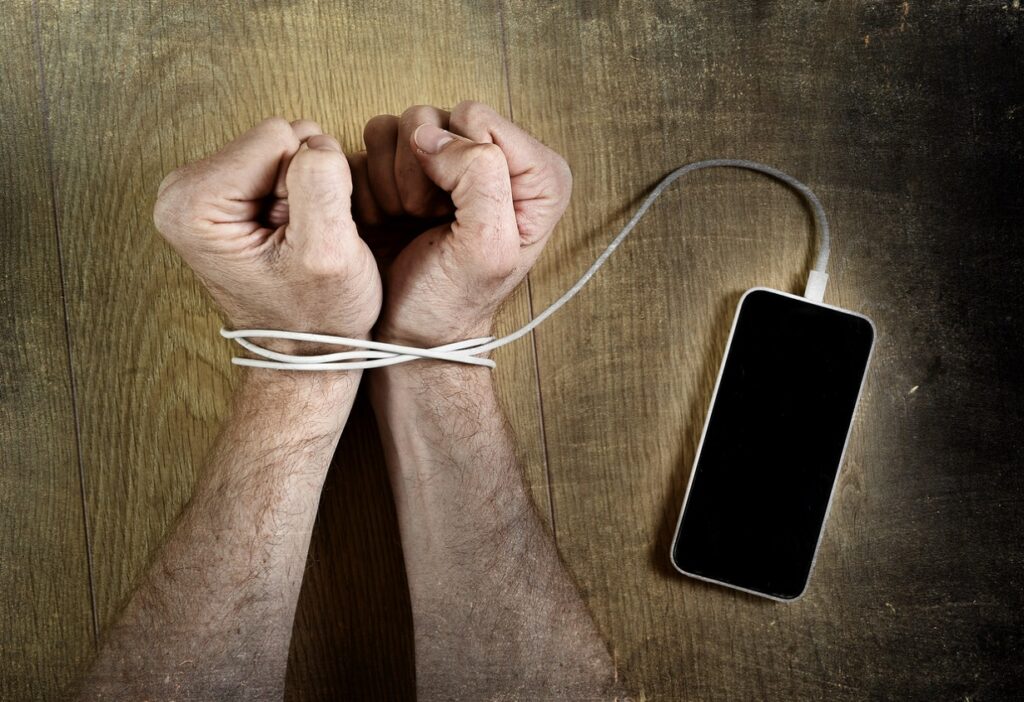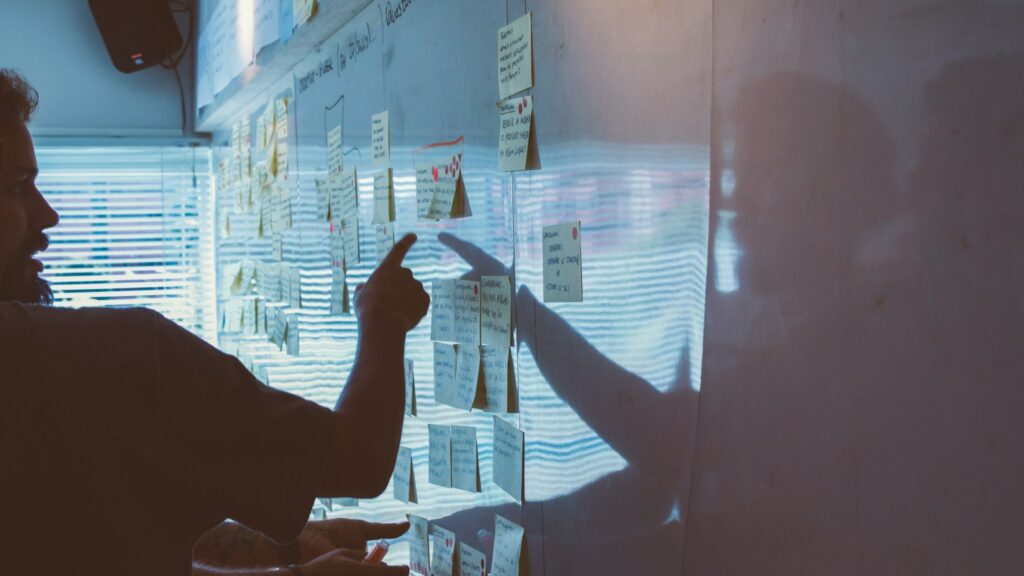We live inside our smartphones. I can’t be the only one to be aware, every time I walk down the street, commuting or just at my local sports club, that most of the time we are completely bound up in our devices.
Our smartphones have become Swiss army knife–like appliances that include a dictionary, calculator, web browser, email, video games, appointment calendar, voice recorder, guitar tuner, weather forecaster, satellite navigation, texter, tweeter, social media updater, and flashlight.
They’re more powerful and do more things than the most advanced computer at IBM corporate headquarters 30 years ago. And we use them all the time, part of a 21st-century mania for cramming everything we do into every single spare moment of downtime.
Technology has given us the ability to do anything we feel like at any time – every time we respond to our phone, look up something on the internet, check email or instant messages, send a text – every single time this tweaks the novelty-seeking, reward-seeking centres of our brain giving an enormous hit of dopamine – effectively rewarding the brain for losing focus and constantly searching for external stimulation.
Our brains are not wired to multi-task when we do several things at once – all that is really happening is that we are just switching from one thing to another really quickly.
And every time we switch there is a cognitive cost. Yet because of the power of dopamine, the urge to check and respond to messages or quickly look something up is in fact compelling. Why?
Dopamine is the culprit…
When the brain is presented with an unexpected reward, dopamine increases, prompting the limbic reward system to take note and remember how to repeat such a positive experience.
This impacts memory and habit formation.
So every time we get that hit of dopamine when we respond to our distractions, we are in effect teaching our brain to continue to do so which is why it feels so compelling to check each time we are aware of a new message or piece of information.
This has a big impact on our ability to manage time efficiently – we end up doing less. How many times have you started on one project only to flit to email and then to a message or a website because something random occurred to you.
By the time you’ve done that you will have lost momentum and concentration on what you were originally working on – it will now take you twice or three times as long to complete.
Because of the power of dopamine, the urge to check and respond to messages or quickly look something up is in fact compelling.
These sorts of action do not include all the interruptions by other people sending you messages or social media which seems to be constantly on most people’s horizons.
Living inside your smartphone simply means you are less present with what is right in front of you. You may miss out on an important conversation or person (your children?).
You are more likely to be edgy and non-focused. You are also never giving your brain a break or a chance to be creative or reflective.
Some easy things to do right now to control the dopamine loop and get more productive. I’ve tried all these recently and the result has been transformative:
1. Take email off your smartphone
“WHAT?”, you say – that is impossible. I must be able to check email. Actually, no you don’t.
If you remove it from your phone you’ll be far less likely to check it first thing when you wake up (just about the worst, productive-sucking thing you could ever do to start your day by the way) and you’ll be more disciplined about when you check it and respond.
Also, by accessing email ONLY through your computer, it is far easier to set up filters and mailboxes which allow you far greater control over your email.
2. Turn off your notifications
Remember that every time you hear the “ping” of a text message, LinkedIn update or social media instant message (we’ll assume for now that you have taken email off your phone, otherwise you’ll have those pinging at you as well) your brain will feel compelled to find out what it is.
It usually is nothing of any importance but your poor brain does not know that. One of the by-products of all this unnecessary information overload is that your brain cannot distinguish between what is important and what isn’t so everything becomes important.
The time that you actually need to spend working gets eaten up by someone’s news feed video or LinkedIn update that could have waited.
3. Remove social media apps
They take up huge amounts of space and I found that when I had the Facebook app on my phone I was checking it frequently throughout the day.
Now it’s not there, I have to enter the website to check my newsfeed – just that little bit of effort means that I am more consciously making a decision to check social media rather than mindlessly scrolling every time I have a free moment. Remember too, that social media is a huge time waster and often negative.
I now go for whole days without checking it.
4. Leave your phone at home
Every day I go for dog walks in the morning without my phone.
Not having it with me means I can’t check it but importantly it frees me up to enjoy the present moment, to practice mindfulness, get ideas and reflect.
It slows me down and that is a great way to start the day.
What can you expect if you do these four things?
- More time to plan your day and prioritise what needs to be done
- You’ll find it easier to uni-task rather than multi-task
- Creativity, ideas and solutions to issues you may have been struggling with
- A sense of calm and control
- You’ll tap into a wiser response mode rather than “react mode”
- You’ll get far more done and you’ll have more time for the things and people that matter.
Unimenta's brand new website launched this month, packed with free resources for HR professionals, soft skills practitioners and freelance trainers. We're offering TrainingZone Members a discount of 15% on our annual subscription plans, which include free access to our workshop materials as well as consultation sessions with Emma Sue Prince. Join us now!
We live inside our smartphones. I can’t be the only one to be aware, every time I walk down the street, commuting or just at my local sports club, that most of the time we are completely bound up in our devices.
Our smartphones have become Swiss army knife–like appliances that include a dictionary, calculator, web browser, email, video games, appointment calendar, voice recorder, guitar tuner, weather forecaster, satellite navigation, texter, tweeter, social media updater, and flashlight.
They’re more powerful and do more things than the most advanced computer at IBM corporate headquarters 30 years ago. And we use them all the time, part of a 21st-century mania for cramming everything we do into every single spare moment of downtime.
Technology has given us the ability to do anything we feel like at any time – every time we respond to our phone, look up something on the internet, check email or instant messages, send a text – every single time this tweaks the novelty-seeking, reward-seeking centres of our brain giving an enormous hit of dopamine – effectively rewarding the brain for losing focus and constantly searching for external stimulation.
Our brains are not wired to multi-task when we do several things at once – all that is really happening is that we are just switching from one thing to another really quickly.
And every time we switch there is a cognitive cost. Yet because of the power of dopamine, the urge to check and respond to messages or quickly look something up is in fact compelling. Why?
Dopamine is the culprit...
When the brain is presented with an unexpected reward, dopamine increases, prompting the limbic reward system to take note and remember how to repeat such a positive experience.
This impacts memory and habit formation.
So every time we get that hit of dopamine when we respond to our distractions, we are in effect teaching our brain to continue to do so which is why it feels so compelling to check each time we are aware of a new message or piece of information.
This has a big impact on our ability to manage time efficiently – we end up doing less. How many times have you started on one project only to flit to email and then to a message or a website because something random occurred to you.
By the time you’ve done that you will have lost momentum and concentration on what you were originally working on – it will now take you twice or three times as long to complete.
Because of the power of dopamine, the urge to check and respond to messages or quickly look something up is in fact compelling.
These sorts of action do not include all the interruptions by other people sending you messages or social media which seems to be constantly on most people’s horizons.
Living inside your smartphone simply means you are less present with what is right in front of you. You may miss out on an important conversation or person (your children?).
You are more likely to be edgy and non-focused. You are also never giving your brain a break or a chance to be creative or reflective.
Some easy things to do right now to control the dopamine loop and get more productive. I’ve tried all these recently and the result has been transformative:
1. Take email off your smartphone
“WHAT?”, you say – that is impossible. I must be able to check email. Actually, no you don’t.
If you remove it from your phone you’ll be far less likely to check it first thing when you wake up (just about the worst, productive-sucking thing you could ever do to start your day by the way) and you’ll be more disciplined about when you check it and respond.
Also, by accessing email ONLY through your computer, it is far easier to set up filters and mailboxes which allow you far greater control over your email.
2. Turn off your notifications
Remember that every time you hear the “ping” of a text message, LinkedIn update or social media instant message (we’ll assume for now that you have taken email off your phone, otherwise you’ll have those pinging at you as well) your brain will feel compelled to find out what it is.
It usually is nothing of any importance but your poor brain does not know that. One of the by-products of all this unnecessary information overload is that your brain cannot distinguish between what is important and what isn’t so everything becomes important.
The time that you actually need to spend working gets eaten up by someone’s news feed video or LinkedIn update that could have waited.
3. Remove social media apps
They take up huge amounts of space and I found that when I had the Facebook app on my phone I was checking it frequently throughout the day.
Now it’s not there, I have to enter the website to check my newsfeed – just that little bit of effort means that I am more consciously making a decision to check social media rather than mindlessly scrolling every time I have a free moment. Remember too, that social media is a huge time waster and often negative.
I now go for whole days without checking it.
4. Leave your phone at home
Every day I go for dog walks in the morning without my phone.
Not having it with me means I can’t check it but importantly it frees me up to enjoy the present moment, to practice mindfulness, get ideas and reflect.
It slows me down and that is a great way to start the day.
What can you expect if you do these four things?
- More time to plan your day and prioritise what needs to be done
- You’ll find it easier to uni-task rather than multi-task
- Creativity, ideas and solutions to issues you may have been struggling with
- A sense of calm and control
- You’ll tap into a wiser response mode rather than “react mode”
- You’ll get far more done and you’ll have more time for the things and people that matter.






3 Responses
I take the view that my phone
I take the view that my phone sits in my bag, on silent, during working hours. I only take it with me if I leave the building. I also switch off my broadband at home after 8pm, so I am not distracted my updates.
My phone sits on my desk and
My phone sits on my desk and I am constantly checking it. I am definitely going to try these techniques.
I love it Emma. The
I love it Emma. The smartphone has literally taken over our lives. We live in a time where the most valuable currency is deep focus, because almost nobody has this anymore. That ability to start something and follow it through without succumbing to distraction is more powerful than it has ever been. I’ve been guilty of checking my phone every 2 minutes and its terrible, that pinging sound used to be music to my ears. It’s like that sound was directly connected to the dopamine centre in my brain. Instant little hits of pleasure haha! I’ve learnt to stay away from the smartphone for hours at a time now, otherwise nothing gets done.